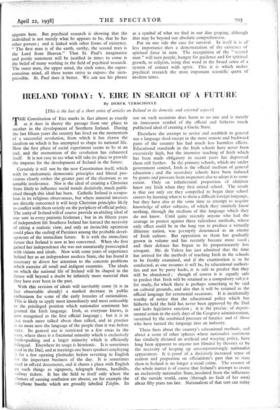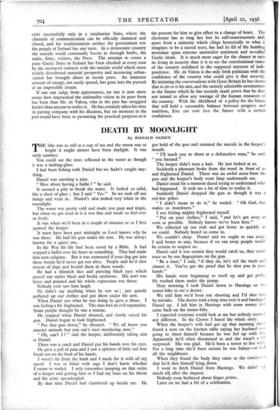IRELAND TODAY: V. EIRE IN SEARCH OF A FUTURE
By DEREK VERSCHOYLE
[This is the last of a short series of articles on Ireland in its domestic and external aspects] THE Constitution of Eire marks in fact almost as exactly as it does in theory the passage from one phase to another in the development of Southern Ireland. During the last fifteen years the country has lived on the momentum of a successful revolution, from which it has drawn the idealism on which it has attempted to shape its national life. Now the first phase of social experiment seems to be at an end, and the momentum of the revolution has exhausted itself. It is not easy to see what will take its place to provide the impetus for the development of Ireland in the future.
Certainly it will not be the new Constitution itself, which with its undramatic democratic principles and liberal pro- visions clearly strikes the greater part of the electorate as an amiable irrelevance. Nor is the ideal of creating a Christian State likely to influence social trends decisively, much publi- cised though this ideal has been. Catholic Ireland is scrupu- lous in its religious observances, but where material interests are directly concerned it will keep Christian principles likely to conflict with them strictly on the periphery of official policy. The unity of Ireland will of course provide an abiding ideal of one sort to every patriotic Irishman ; but in its fifteen years of independent life Southern Ireland has learned the necessity of taking a realistic view, and only an invincible optimism could place the ending of Partition among the probable devel- opments of the immediate future. It is with the immediate future tlazt Ireland is now at last concerned. When she first gained her independence she was not unnaturally preoccupied with visions and ideals. Now with some years of experience behind her as an independent modern State, she has found it necessary to divert her attention to the concrete problems which exercise all small and indigent countries. The ideals on which the national life of Ireland will be shaped in the future will beyond a doubt be infinitely more material than they have ever been in the past.
With this revision of ideals will inevitably come (it is in fact observable already) a marked decrease in public enthusiasm for some of the early luxuries of nationalism. This is likely to apply most immediately and most noticeably to the privileged position which nationalist sentiment has granted the Irish language. Irish, as everyone knows, is now recognised as the first official language ; but it is in ;act much more talked about than talked, and in practice is no more now the language of the people than it was before 1922. Its general use is restricted to a few areas in the west, where there is a fractional minority which is exclusively Irish-speaking and a larger minority which is efficiently bilingual. Elsewhere its usage is histrionic. It is sometimes used in the Dail, and at meetings one hears speakers employing it for a few opening platitudes before reverting to English for the important business of the day. It is sometimes used in official documents, and it shares a place with English on such things as signposts, telegraph forms, handbills, railway tickets. It has the field to itself only where the hances of _causing confusion are absent, on for example the telephone booths which are proudly labelled Telefdn. Its use on such occasions does harm to no one and is merely an innocuous symbol of the official and hitherto much publicised ideal of creating a Gaelic State.
Elsewhere the attempt to revive and establish in general use a language dead except in the more remote and backward parts of the country has had much less harmless effects. Educational standards in the Irish schools have never been excessively high, but the intensive teaching of Irish which has been made obligatory in recent years has depressed them still further. In the primary schools, which arc under government control, Irish is the official medium of general education ; and the secondary schools have been induced by grants and pressure from inspectors also to adopt it to some extent. Only an infinitesimal proportion of children know any Irish when they first attend school. The result is that not only are they compelled to begin their school careers by learning what is to them a difficult foreign language, but they have also at the same time to attempt to acquire knowledge of other subjects, of which they similarly know nothing, through the medium of this language which they do not know. Until quite recently anyone who had the courage to protest against these ridiculous methods, whose only effect could be in the long run to produce a virtually illiterate nation, was promptly denounced as an enemy of Irish culture. But opposition to them has gradually grown in volume and has recently become more vocal and their defence has begun to be proportionately less arrogant. Mr. de Valera has just admitted that the time has arrived for the methods of teaching Irish in the schools to be freshly examined, and if the examination is to be conducted, as one assumes it will be, by educational authori- ties and not by party hacks, it is safe to predict that they will be abandoned ; though of course it is equally safe to predict that Irish will be retained as a compulsory suNe et for study, for which there is perhaps something to be said on cultural grounds, and also that it will be retained as the official language for ceremonial occasions. It is incidentally worthy of notice that the educational policy which has hitherto held the field has never been approved by the Dail and lacks legislative sanction ; it is the product of depart- mental action in the early days of the Cosgrave administration, sustained by the combined pressure of fanatics and of those who have turned the language into an industry.
These facts about the country's educational methods, and about a score of other spheres where nationalist sentiment has similarly dictated an artificial and warping policy, have long been apparent to anyone not blinded by theories or by the necessity of keeping up uncompromisingly nationalist appearances. It is proof of a decisively increased sense of realism and proportion on officialdom's part that to state them in Ireland is no longer a social crime. The essence of the whole matter is of course that Ireland's attempt to create an exclusively nationalist State, insulated from the influences of the outside world, came (through no fault of her own) about fifty years too late. Nationalism of that sort can today exist successfully only in a totalitarian State, where the channels of communication' can be officially dammed and closed, and for totalitarianism neither the government nor the people of Ireland has any taste. In a democratic country the outside world continually bursts in through books, the radio, films, visitors, the Press. The attempt to create a pure Gaelic State in Ireland has been checked at every turn by the increased contacts with the outside world which more widely distributed material prosperity and increasing urban- isation has brought about in recent years. An immense amount of energy, not easily spared, has gone into the pursuit of an impossible dream.
If one can judge from appearances, no one is now more aware how impractical the nationalist vision in its pure form has been than Mr. de Valera, who in the past has struggled harder than anyone to realise it. He has certainly taken his time in parting company with his illusions, but no moment in the past would have been as promising for practical purposes as is the present for him to give effect to a change of heart. The electorate has at long last lost its self-consciousness and, apart from a minority which clings hysterically to what it imagines to be a sacred trust, has had its fill of the humbug attendant upon extreme nationalist sentiment and so-called Gaelic ideals. It is much more eager for the chance to earn its living in security than it is to see the constitutional status of the country redefined in the supposed interests of inde- pendence. Mr. de Valera is the only Irish politician with the confidence of the country who could give it that security. By initiating the conversations with Great Britain he has shown that to do so is his aim, and the entirely admirable nominations to the Senate which he has recently made prove that he does not intend to allow any wastage of the human resources of the country. With the likelihood of a policy for the future that will hold a reasonable balance between progress and tradition, Eire can now face the future with a certain confidence.











































 Previous page
Previous page